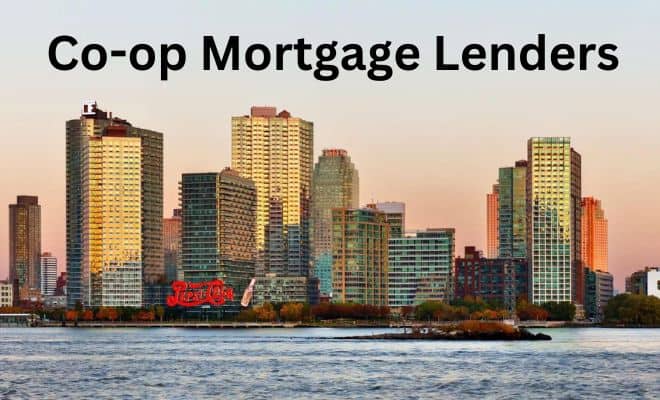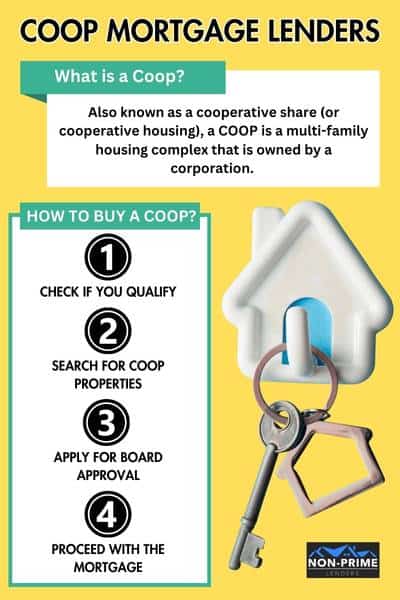
When purchasing or refinancing a co-op, you may struggle to find a mortgage because co-ops are difficult to finance with conventional or FHA. There are coop mortgage lenders who specialize in creative financing and will help those who have good credit and a down payment.
What is a Co-Op?
A co-op, which is also known as a cooperative share (or cooperative housing), is a multi-family housing complex that is owned by a corporation. Instead of purchasing an individual unit, as would be the case with a traditional condominium complex, you purchase a share of the corporation that owns the building. Therefore, you are essentially a shareholder in the corporation, versus a typical homeowner. Fortunately, each participant (or shareholder) gets to occupy a unit in the housing complex.
Coop Mortgage Lenders
The majority of banks and mortgage lenders do not offer financing for co-ops. You will want to speak with a lender who does offer financing for these types of mortgages. Below are some of the best mortgage lenders that offer programs for co-ops, along with what locations they serve.
This is just short list and an example of many that we have in our network. Keep in mind that each lender has different credit score, down payment, and income documentation requirements. Rather than speak to each of them and having your credit pulled multiple times, allow us to help you to find the best option for your scenario. Please complete this short request quote form and we will help.
Northstar Funding – California, Colorado, Connecticut, Florida, Georgia, Illinois, New Jersey, New York, North Carolina, Oregon, Pennsylvania, Rhode Island, South Carolina, and Washington D.C.
Alpine Mortgage Services – New Jersey and New York.
First Republic Bank – California, Florida, Massachusetts, New York, and Oregon.
Total Mortgage Services – Connecticut, Florida, Massachusetts, New York, Rhode Island, and Wisconsin.
California Mortgage Advisors – California.
Quicken Loans – Quicken Loans serves most of the nation with traditional home loans, but for co-ops, it appears they are currently only providing this type of financing to borrowers in New York, particularly NYC.
Eastland Mortgage – Florida and New York.
If you would like some assistance finding a co-op lender, contact us today, we would be glad to help you.
How to Buy a Co-Op / Steps to Buying a Co-Op
Buying a co-op is not as simple of a process as buying a condo, townhome, or 1-4 unit residence. You will need to take certain steps in order to accomplish buying this type of property.
Step 1 – We recommend that before you do anything, see if you will qualify for a co-op loan. It would be a shame to find a co-op that you want to buy, and do everything else that you need to do, only to find out that you can not obtain the necessary financing to secure the purchase.
We can help connect you with a co-op mortgage lender in the location that the co-op you want to purchase is at. Keep in mind, a co-op loan is not technically a mortgage, but does acts similar to one. You basically are obtaining a loan to buy the shares in the cooperative.
Step 2 – Search for co-op properties in your desired location. We recommend that you use a real estate agent that has plenty of experience with these types of properties. The process of buying a co-op is different, so it would be helpful to have an agent familiar with the differences in buying a co-op verses a condominium.
As for searching for a co-op, the easiest way to find one is to search homes for sale on real estate websites, such as zillow.com or realtor.com. You can then view each listing to see which is a co-op.
Step 3 – Once you have found a co-op that you are interested in, you will need to go through an approval process with the board of the corporation that owns the building. Be sure to present yourself in the best light possible, as it will ultimately be up to them if they approve you. Most boards will closely review your financial situation, and are likely to want to see at least 2 years of liquid assets to cover the mortgage payments and maintenance costs.
Step 4 – Upon being approved by the board of the co-op, you will then want to proceed with the mortgage loan. If you have already been pre-approved (which we recommend be your first step), you can then move forward with having the loan processed. You will likely need to submit income documentation, an appraisal, and whatever other specific requirements the lender has, which must be satisfied before the loan closes.
Down Payment Needed to Purchase a Co-op
Lenders who finance coops do not provide 100% financing or small down payment options. These loans are considered to be Non QM mortgages and come with higher down payment requirements.
Depending upon your credit scores, lender, and economic environment, you can expect the down payment to be 10%-20% for a coop.
Is it Worth Buying a Coop?
Coops are traditionally less expensive than a condo. It could be worth buying a coop in an area where condo prices are too expensive. In New York City for example, a condo will cost more than the majority of home shoppers can afford and a coop offers the opportunity to buy at a more reasonable price.
To determine whether it is worth buying a coop, you need to understand the future resale value of the coop versus how much you may save over time when buying at a reduced price. The true answer is one that each person must determine on their own.
Risks of Buying a Coop
There are some risks of buying a coop that you need to consider before moving forward. These are just a few examples:
- More difficult to finance
- More difficult to sell
- The Coop board must approve your buyer
- The Coop board must approve your financing and down payment
- You may not be allowed to rent out the coop
- Many rules that can be changed by corrupt board members
These are just a few of the risks that you need to consider before purchasing a coop. It is recommended to consider a condo before a coop if at all possible.
What Happens When You Payoff Your Coop?
When you payoff your coop, there are a few things that need to occur to protect your ownership interest.
- You should receive a payoff confirmation document from the lender
- You should receive the lease and coop stock from the lender which was their way of retaining a lien against the loan.
- You will need to file the UCC-3 Termination Statement which officially ends the lender’s ownership of your coop shares.
Up until this point, the bank holds the shares in the coop. It will be your job to follow up with the lender and take an active role in making sure all of the steps are followed so ownership can be transferred over to you.
Frequently Asked Questions
What are the pros and cons of a cooperative housing (co-ops)?
The primary advantages are accessibility and affordability. If you desire to live in a particular building that is a co-op, you will have no other option, but to purchase the necessary shares to live there. In terms of affordability, sometimes a co-op may be overall cheaper than a similar condominium. The disadvantages of a co-op is that it can be a somewhat difficult process. Co-ops also require a larger down payment, high monthly maintenance fees, and there are less total lenders that offer these types of loans. You also should be aware of what can result of the co-op goes bankrupt, and the property is foreclosed on.
What happens if the cooperative goes bankrupt and forecloses?
Something you want to carefully consider is what will happen if the co-op goes bust (becomes bankrupt). In the event that the co-op defaults on it’s mortgage, and files for bankruptcy, the lender will likely move to foreclose on the property. This can be a terrible situation for shareholders, since the lender could move to evict all of the shareholders/occupants. The foreclosure process may take years to complete, and the lender may allow the shareholders to basically become tenants, but the ownership rights of shareholders would simply vanish. This is a not very common, but it certainly does happen.
What happens if I personally default on my loan, which results in a foreclosure?
In the event that you were to default on your own loan, the lender will likely want to sell the shares in the corporation that you own. In order to do this, they will need the cooperation of the board of the co-op. Before your loan is cleared to close, the lender may want to have some assurance from the board that they will be able to sell the shares, so that they are not stuck with the shares/loan.
Are there any important questions I should ask when buying a co-op?
It is advised that you are scrupulous about the overall financial responsibility of the co-op board. Some prospective co-op buyers will hire an accountant to inspect the books to see that all the finances are in order. Whether you ask for them yourself, or have an accountant do it for you, try to get at least 3 years of financial statements. You should also ask the board what sort of reserve fund they may have in place, which could help protect them against having a future default, bankruptcy, or foreclosure.
In addition to ensuring that the board is financially responsible, you will also want to make sure that they do a good job of keeping up with the maintenance of the property. Some questions may not be as easy to ask, or to get an answer for, so you can also do your best to inspect the condition of the property yourself. Does the property seem well maintained? Does the elevator seem like it may need to be replaced? Try to get an accurate assessment of how well kept the property is, and don’t be afraid to ask questions about it’s maintenance.
How do I get pre-approved for a co-op mortgage loan?
If you would like to get pre-approved for a co-op mortgage, we can match you with a co-op mortgage lender in the location the cooperative is located at. Your loan representative will also be able to answer a lot of your questions, and potentially help connect you with a real estate agent that has plenty of experience with co-ops.

